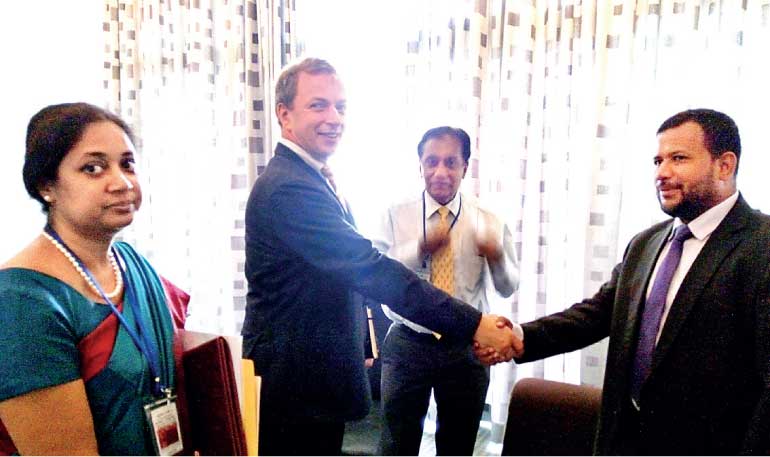Sunday Feb 22, 2026
Sunday Feb 22, 2026
Monday, 2 October 2017 00:09 - - {{hitsCtrl.values.hits}}

From left: Himali Jinadasa – Senior Advisor to Minister Bathiudeen, New Delhi based UNIDO Regional Representative Rene Van Berkel, Head of UNIDO focal point office in Sri Lanka Nawaz Rajabdeen meet Minister of Industry and Commerce Rishad Bathiudeen in Colombo /File photo
UN’s specialised agency for industrial development working to usher inclusive and sustainable industrialisation framework will unveil its way forward on industry framework of Sustainable Development Goals (SDGs) on Sri Lanka today (2 October) for the first time.
The visiting New Delhi based UNIDO Regional Representative Dr. Rene Van Berkel will be addressing the Lankan public this afternoon elaborating on background, opportunities and challenges for business from the SDGs and provide practical examples from the work of the United Nations Industrial Development Organisation in South and South-East Asia on advancing inclusive and sustainable industrial development.
Dr Berkel will be addressing the public at 5:30 p.m. at CWE Secretariat, 9th floor, No 27, Vauxhall Street, Colombo 2. Dr. Berkel also visited Sri Lanka in July and met the Minister of Industry and Commerce Rishad Bathiudeen.
The 193 Member States of the United Nations universally adopted on 25 September 2015 ‘Transforming our World: the 2030 Agenda for Sustainable Development’. The Agenda is operationalised in 17 Sustainable Development Goals (SDGs) with 169 associated targets, converging into one destination: the journey to the future we want! SDGs in the areas of poverty, nutrition, sanitation, health, education and environment are principally a diversification and extension of the efforts started during 2000-2015 under the Millennium Development Goals (MDGs) to speed up and redouble impact, particularly for the most vulnerable in society under the adagio of ‘reaching the furthest behind first’ to ensure that indeed ‘no one will be left behind’.
Other SDGs are new, relative to the earlier MDGs, and aim to transform the large-scale drivers to sustainable development outcomes, including economy, jobs, industry, cities, consumption and production, peace, justice and partnerships. The 17SDGs as a package are integrated and ambitious, and hence indivisible.
It is the first time ever that industry has been explicitly included in the development agenda, specifically the achievement of inclusive and sustainable industrialisation (SDG9).
This reflects the widespread recognition that industry is indispensable for achieving inclusive and sustainable economic growth. Business as usual is though not viable in light of natural resource, environment and climate constraints.
A transformation is needed to get industries that are fit for the present and for the future, by being productive and competitive, zeroing out emissions and waste, and creating value with all stakeholders, in short inclusive and sustainable industrialisation. Business leadership is particularly sought to provide scalable solutions that ‘put the last ones first’ in areas as diverse as affordable housing, sustainable cities and mobility, food and nutrition, and healthcare.
UNIDO is UN’s specialised agency for industrial development.